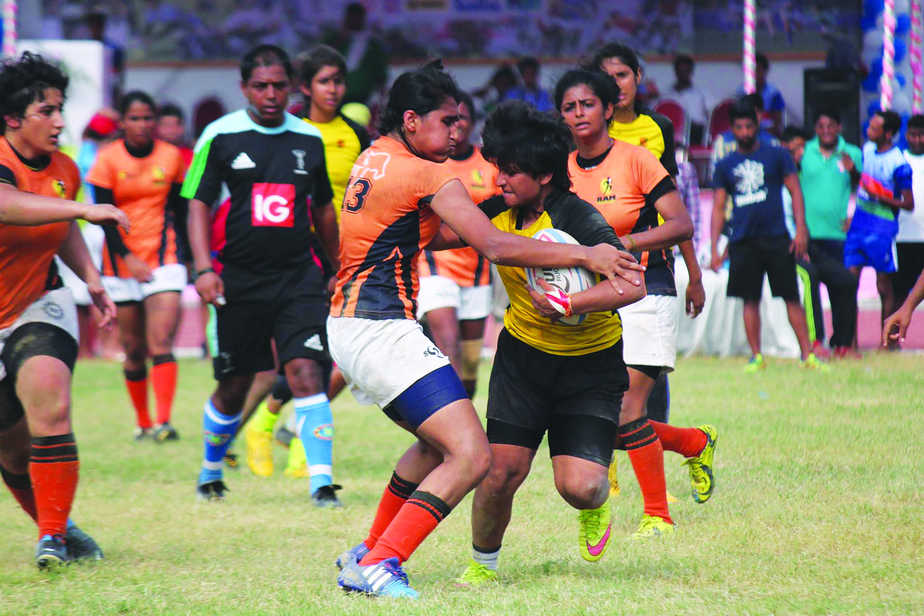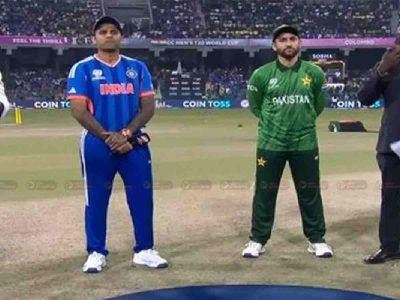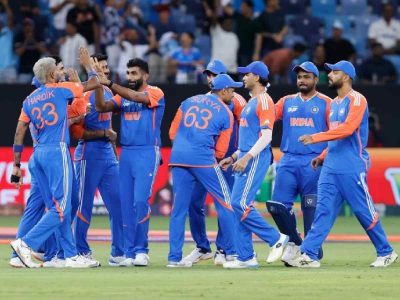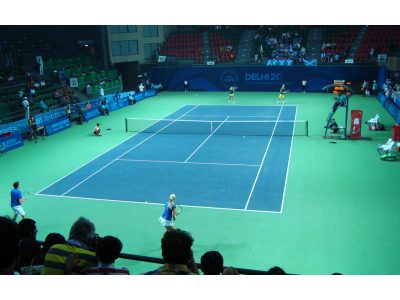With sports like cricket, football and badminton ruling the minds of Indians, rugby somehow remains in the shadows as clubs in Delhi find it difficult to even sustain themselves
While the whole country is watching the Fifa World Cup and awaits the Indian cricket team’s tour of England next month, 29-year-old Gautam Dagar is waiting in eager excitement to travel to Chandigarh to lead his team Delhi Rebels in the national rugby tournament where 24 clubs will compete. Dagar is the captain of the Indian National Rugby Team.
But life for rugby players like Dagar is not easy in India. “There is little or no infrastructure for the sport, and people have no interest in the game. It does not enjoy the popularity of say, cricket or even badminton”, says Dagar.
Dagar’s club, Delhi Rebels was started in 2015, with an aim to impart training in the sport to young minds. “We wanted to focus more on players and their development, so that we can infuse young minds with the passion for rugby”, says Dagar. “We usually urge youngsters from the lower strata of society, who are enthusiastic about sports, but don’t know what game to play. We channel their sporting talents to train them for rugby”, he says. “Our training programme includes full body workouts especially for the upper body, since rugby requires a lot of upper body strength to dodge the tackles,” says Dagar, who is also a trained rugby coach.
The oldest rugby club in the city, Delhi Lions, started in 1998. The Delhi Rugby Football Association has an extensive training programme for children. “At the first level, we train them in non-contact rugby. We just give them the ball and ask them to run a lot and give them exercises to improve their physical strength. Once we assess whether they are strong enough, then only we start training them to tackle and handle and dodge tackles”, says Adesh Kumar, a coach at the club.
Kuldeep Bisht, trainer at the most popular and successful club in the city, Delhi Hurricanes, says that the club has separate training regimes for different age groups. “Rugby is an extremely physical sport. So the physicality of a 12-year-old will definitely be different than a 19-year-old, and hence the different training and diet routines”, says Bisht.
But in spite of doing their utmost to train youngsters into the sport, the clubs face a lot of problems.
Lack of funds and sponsorships is a major obstacle in the development of the sport, says Gautam Dagar. “Our club was founded by me and a couple of players and ex-players who care for the well-being of the sport. It is completely run by us. We do not charge a penny from our students, and we pay for all their costs including travel, diet and equipment”, says Dagar.
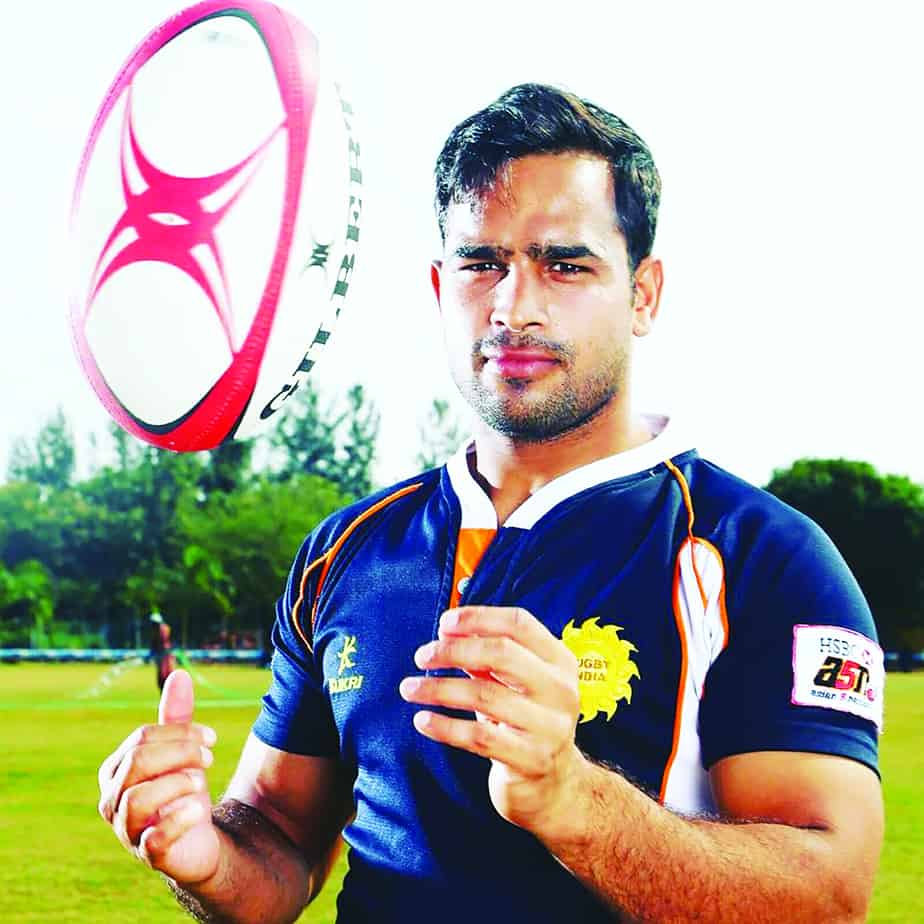
For Delhi Hurricanes, the money mainly comes from funds of ex-players and coaches. Interestingly, Hindi film actor Siddharth Malhotra, a former player at the Delhi Hurricanes club, donates a substantial amount regularly, and is one of the major contributors in sustaining the club, says Kuldeep Bisht. “We do not get any help from the government, the rugby federation or the sports ministry”, adds Bisht. The same can be said about Delhi Lions, where the coaches themselves contribute from their earnings to sustain the club.
On top of that, all these clubs suffer from lack of a proper ground. “We train inside a public DDA park in Mehrauli”, says Gautam Dagar. “The DDA had prepared grounds for rugby and we started training there, but couldn’t train there for long, as the ground was rented out to other sports like cricket and football. Thus we are left with nowhere to play”, says Dagar, who being the national captain, himself trains at the park. “The guards at the park even shoo us away sometimes, as they say we are occupying a lot of space and not letting the public use it”, he says with regret.
“Playing in public parks is very risky as they don’t maintain the grass covers according to standards of rugby. There is a high risk of injury”, says Dagar. “In addition to this, trees and light poles all around the park make it even more difficult for us”, he adds.
Delhi Lions started out training at the Jawaharlal Nehru Stadium, but their licence was cancelled because the authorities wanted to lease out the stadium to more football clubs. “After that we started playing at the polo grounds in North Campus, Delhi University, but then the ground was taken by the authorities to renovate and reconstruct it for the Commonwealth Games. During that time, we trained at our owner’s farmhouse in Chhatarpur”, says Adesh Kumar. “We even played a little at the newly constructed rugby grounds in North Campus, but they were taken away from us as cricket pitches were constructed there”, adds Kumar. After that they leased a land in an agricultural area near Bawana, but that land too was not to last long, as their lease got cancelled for playing sport on a land meant for agriculture. “Now, we have no ground of our own as we train in a public park in Rohini”, he adds. “The rent of the grounds varies from Rs 25,000-30,000 per day, and it is extremely costly for us”, adds a dejected Kumar.
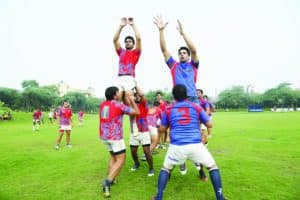
“We run our academy inside the DDA sports complex in Vasant Kunj, which was meant to be a training ground exclusively for rugby. But now they have constructed goalposts and cricket pitches there, and have been renting it out for cricket and football matches”, says Kuldeep Bisht. “Earlier, we had regular training programmes there every day of the week, but our licence was terminated without notice, and now we rent it only on Saturday and Sundays at Rs 400 per hour, which is very costly, considering that there is very meagre funding behind us”, adds Bisht. He even complains that the DDA does not maintain the ground and the irregular grass covering on it can lead to injuries, especially in a physical game like rugby.
Despite all the difficulties, what matters for the clubs are the trophies they bring home. “Despite the lack of funds and a proper stadium, our boys and girls are really doing well. Our club came first in the whole country, and our girls came third. So all our hard work is somehow fulfilled”, says Bisht.
According to Dagar, what is most heartening for him is that the awareness of rugby that is growing in the country. “Earlier we had only 15 players who trained with us, and now we have over 200 boys and around 130 girls”, he adds.
Kuldeep Bisht also promises to bring a world class rugby training facility in the city, as Delhi Hurricanes is in talks with Leicester Tigers, the biggest rugby club in the world, to start an academy in the city.
“Even a country like Sri Lanka has one of the best rugby facilities in Asia and is a major player in the rugby. So being such a huge country, our setup should also be world class”, says Bisht. “The only two dedicated grounds for rugby we have in India are in Kolkata and Mumbai. Being the capital city, we should have a world class facility so that we can impart the best training and make rugby a major sport in the country”, concludes Bisht.

